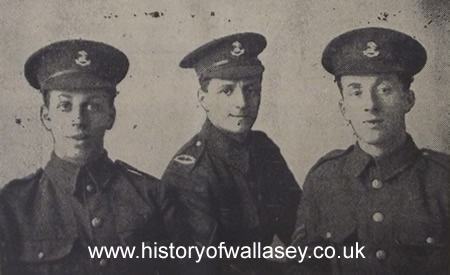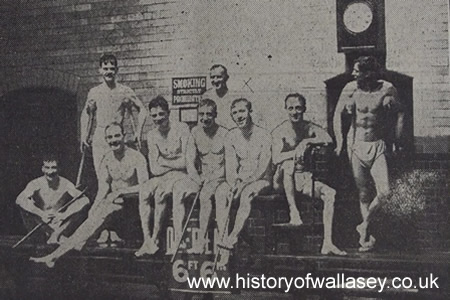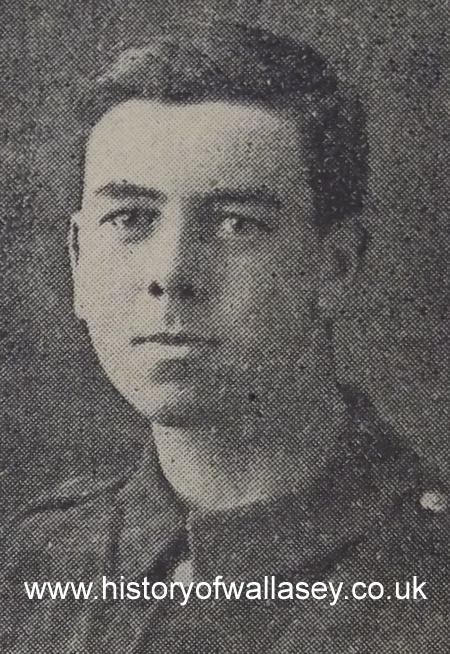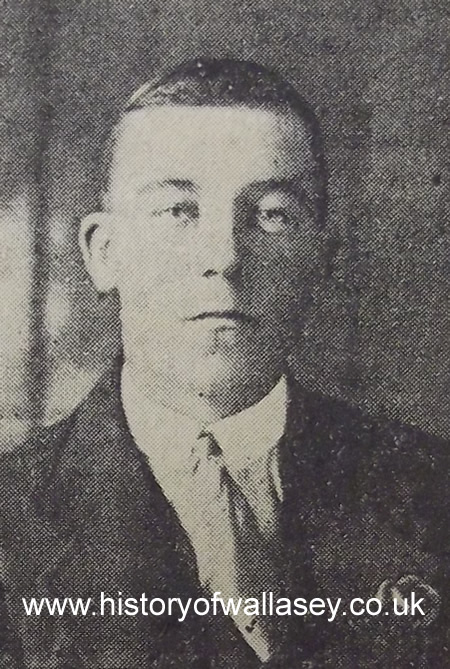Wallasey Chronicle
The Great Push
July 1916
Wallasey’s Heavy Toll
Many Local Men Killed And Wounded
As was only expected, the great push by the British in France has entailed a heavy list of casualties, and unhappily numerous Wallasey men figure amongst the killed and wounded.
While Gallantly Leading Platoon
The death is announced of Second-Lieutenant Frank Paterson, of the King’s Own Scottish Borderers. Lieut. Paterson resided at 9 Zigzag Road, Liscard. He was twenty-nine years of age, and had been engaged as a ledger clerk in the Borough Treasurer’s department of the Wallasey Corporation for thirteen years.
When war broke out he had been for seven years in the Liverpool Scottish, and immediately entered upon his duties as sergeant, receiving his commission in the Borderers in June of last year. After serving in Egypt, he was sent to France, and Colonel A.J. Walsh, in communicating the sad intelligence of his death, writes that he was killed in action on the morning of the July 1st whilst gallantly leading his platoon to the attack, and on behalf of all ranks of the Borders he conveys their deepest sympathy and condolence.
Lieutenant Paterson was an old boy of Liscard High School, and played for the Old Boys’ team in cricket and football, and he had won two cups in connection with the Liverpool Scottish – one for shooting and the other for a marathon race. He was a member of St. Mary’s Church, and acted for some time as the local secretary of the National Service League.
He was deeply loved by a large circle of friends in Liscard, who regard his loss as a very personal matter.
Grammar School Champion Killed
Official intimation has been received of the death of Lieutenant Ralph V. Merry, King’s Liverpool Regiment. Lieut. Merry was twenty-two years of age, and the second son, of Mr. A. Merry, 0f 63, Manor Road, Liscard. On the outbreak of war he joined the Liverpool “Pals,” and later received his commission in the same battalion. He was an old boy of the Wallasey Grammar School, and will long be remembered for his athletic feats in the connection. He won the school championship for two years years in succession (1910-11), and had many medals, for swimming, running, and the high jump, besides representing the school in the football and cricket teams. He had travelled about a good deal in connection with mine engineering, but immediately prior to the outbreak of war he was engaged in the Liverpool office of a London firm of metal merchants. His elder brother holds a commission in the 6th King’s Liverpool at the present time.
Harrowby Footballer Killed
All interested in local football will deeply regret to hear that George McGuinness, the popular Harrowby forward, who belonged to the Liverpool “Pals,” has laid down his life in his life in his country’s cause. He was a schoolmaster in Liverpool, and resided at Falkland Road, Egremont. His brother, James McGuinness, who is also a well-known Harrowby, was recently wounded, and is now in hospital at Bath.
Three Wallasey Brothers
Two Out Of Action
Another Wallasey man to participate in the great “push” was Sergeant Thomas Herbert Barton (Liverpool “Pals”), of 11 Perrin Road, who is at present lying in Mill Road Hospital, Liverpool, suffering from shell shock. Sergeant Barton, who was in the second line at the time of the advance, and also received wounds in the arm and leg, declares that the British steel helmets were instrumental in preserving many valuable lives. The sergeant is well-known in Wallasey Village and prior to enlistment was employed by the Mersey Docks and Harbour Board, He had completed five years’ service with the Territorials before broke out.
 |
L-R : Pte. A.E. Barton, Corpl. J.F. Barton, Sergt. T.H. Barton |
A brother, Corporal John Frederick Barton, has also been “in the thick of it,” though happily he has come through the ordeal unscathed. Another brother, Private Albert Ernest Barton, also of the Liverpool “Pals,” is unfortunately suffering from spotted fever, and has been in Netley Hospital for 19 weeks. Regrettable to relate, the young man has had a relapse, and much anxiety is felt by his parents.
“Don’t Worry”
An example of the stoical fortitude which the British “Tommy” invariably shows in the face of adversity will assuredly be found in the case of Lance-Corporal Charles Edward Jagger, of the 18th King’s Liverpool Regiment (2nd Liverpool “Pals”). At present lying in a French hospital, this unfortunate young man sustained a bullet injury to the wrist which has necessitated the amputation of the left hand. In spite of his misfortune , however, Lance-Corporal Jagger is wonderfully optimistic, as will be seen from the following letter which he has written to his parents at Church House (Egremont Presbyterian), Seabank Road.
“You will doubtless have received by now the field postcard sent by the chaplain stating that I am wounded. However, it is nothing to worry about. The bullet got me in the left wrist, and my hand has had to come off. Am very comfortable in hospital; nothing to do but be there and eat three meals a day. Have not had much pain so far.
Don’t worry: there are many worse cases than mine.”
The field postcard referred to has not yet arrived. In a latter epistle the wounded soldier says he is on ordinary diet and getting along well. Every kindness is extended to him by the chaplain, the Rev. S. Hamill Wilkinson, who is, by a singular coincidence, personally acquainted with several Liscard ministers.
Seriously Injured
A field postcard also announces that Private. G.H. Woodhead, of 5 Ripon Road, Wallasey, has been wounded. This soldier is another “Pal,” being attached to the 18th Battalion King’s (Liverpool) Regiment. The injuries are said to be fairly serious.
Old Wallaseyan Falls
Another old Wallaseyan to lose his life is Rifleman Hugh Murdock, of the King’s Liverpool Regiment, whose parents reside at 19, Rudgrave Square, Egremont, although he himself had been living in Liverpool latterly. Mr. Murdock has received a letter from his son’s friend, Walter S. Baker, who says that Rifleman Murdock was killed at 8 am on July 1st during an attack on the German lines, and buried at 7 pm, the same day in a little cemetery in the village where they are billeted, just three miles behind the firing line.
The brave soldier was twenty-eight years of age and the son of Mr. Hugh Murdock, of H.M. Customs and Excise, Liverpool. He had only been married just over two years, and leaves a widow and one young child. He joined the Army in September, 1914, and was sent out to the front in the following September, and had five days leave only this last Christmas. He was engaged in Messrs. Singlehurst’s shipping office, Liverpool, prior to enlistment.
 |
Injured Tommies returning from the Front having a dip at Seacombe's Guinea Gap Baths. |
Twice Wounded
Mr. Tunstall, 15 Kenwyn Road, Liscard, has received intimation that her son, Private George Tunstall, of 19th King’s Liverpool Regiment (Pals”), is at present lying in a French hospital, and will probably be removed to England very shortly. The informant does not disclose the nature of the injuries.
Private Tunstall, who is 20 years of age, was formerly employed in the purchase department of the Canadian Pacific Railway, Liverpool, and enlisted at the outbreak of hostilities. This is the second occasion on which he has been wounded, as during the earlier portion of the year he was buried beneath the debris in the collapse of a dug-out along with a former member of the Chronicle staff, who has since been killed.
 |
 |
George Tunstall |
Fred Bedson |
In the Queen Mary’s Military Hospital, at Whalley, near Blackburn, Lce.-Corpl. F Bedson,Wallasey “Pals,” 1 Balmoral Road, New Brighton, is lying seriously wounded. He was a ferry employee, and a member of the New Brighton Lifeboat crew. There are fourteen New Brighton lifeboatmen serving in the Navy and Army, and Lance-Corpl Bedson is the first to be seriously wounded.
Egremont “Pal” Killed
Another “Pal” who has fallen in the country’s cause is Stanley, the only son of Mr and Mrs F. Booth, of 22 Glenalmond Road, Egremont. He was 19 years of age, and was killed in action on July 1st.
An All-Round Athlete
The death is announced of Lance-Corporal Leonard Herbert Pringle (23), of the 19th King’s Liverpool Regiment, who was killed in action on July 1st. Death, which came instantaneously, was caused by the explosion of a shell, and at the time deceased was attached to a trench mortar battery. Several sorrowing chums carried out the burial service the same day, and a cross was placed on the grave before leaving.
Deceased, who resided with his parents at 29 Brougham Road, Seacombe, was a familiar figure in Liverpool commercial circles, having served his time with Messrs. Larrinaga and Co. His education was received at Sefton School. A good all-round athlete, Lance-Corporal Pringle had carried off quite a number of medals for skill in football, cricket, and swimming. The possessor of a voice of excellent timbre, he was a prominent member of the choir at Ullet Road Unitarian Church. He enlisted at the commencement of the war, and had been out in France since November last.
Warren Drive Bereavement
Mr and Mrs J.H. Woods, of the Croft, Warren Drive, New Brighton, have received notification of the death of the death of their second son, Private Albert Rothwell Woods, Liverpool "Pals," who was killed in action on July 1st; and, according to the informant, an officer of the battalion, death came instantaneously. Private Woods, who was only eighteen years of age, had been in the Army some fifteen months, and prior to enlistment was an employee of Messrs. Ralli Brothers, Liverpool. An ardent motor-cyclist and a keen sportsman. He was formerly a playing member if the Aughton Hockey Club.
Singularly enough, deceased's eldest brother, W.F. Woods, was slightly wounded in the shoulder on the same day, and is at present lying in Alder Hey Hospital, West Derby. Please to relate, however, the wounded soldier is making satisfactory progress towards recovery.
Heroism Of The Cheshires
The heroic part the Cheshire are playing in the great British offensive, which is now making such brilliant progress in France, is graphically described in the following despatch from the front by Mr. W. Beach Thomas, which appeared in the Daily Mail of Saturday last:- “To the east of the Albert Bapaume road some troops, principally recruited in Cheshire and Lancashire, were given an objective some 800 yards to their front; and while consolidating this patrols were to be sent to a yet further point. This manoeuvre went according to the book except in one detail. Everyone went too far, just as the padre of Souchez went too far, because the object of their walk was unrecognisable or had ceased to exist. There was no trench where a trench ought to be, had been, was till yesterday. As an infantryman said , “That is the worst of our artillery. They destroy your landmarks.”
Whatever reason – mistake, or keenness – the fact was that at dawn several platoons found themselves in a short piece of trench running like a half-crossed “t” across the chief communication trench. They were absurdly in advance, “in the air,” with the enemy on both sides of them, but they decided that it was a great place to see from. So they manned this cross of the “t” with guns and machine guns.
The enemy, of course, discovered them and telephoned to the artillery, who made good shooting. But in spite of loses, they stood it, perhaps because they knew that the real visible enemy would follow the shells, and it was so. Before the day was old, little groups of Germans were seen gathering in a dozen places in front and on the flanks. On these they had their revenge, but the little party was whittled down to nothing in a trench both blocked and opened out by shell fire.
At last an officer and six men found themselves alone in the extreme edge of the trench. All they could do was to cut and run across the open by the shortest possible paths to the communication trench. Two of them, an officer and a sergeant, got safely through, formed a defence post as far up as possible in the communication trench, and prevented any further progress of the enemy. Last night the whole place was absorbed in cur, advance.
New Brighton Private’s Experiences
Private Francis Woods, 4th Company of the King’s Liverpool Regiment, of 25 Warren Drive, New Brighton, who is among the wounded, relates some interesting facts anent the work of the Liverpool “Pals” in the great offensive.
“Our work” he says, “was to follow up the other companies and to clear out the trenches. We bombed and searched dug-outs, cleared the trenches of prisoners and dead, and held on. The prisoners seemed rather pleased than otherwise to fall into our hands, as for eight days they hardly any food to eat, and that the shelling by the British had been terrific. They were in a fearfully unkempt condition, with days of growth on their faces, and some of them looked to be quite fifty-nine years of age. In fact, one man was fifty-nine. This prisoner said the war would last some time yet, as the Germans have got plenty of men.”
Sorely Stricken Street
Although it contains rather than thirty houses, Tower Street, Liscard, has made a name for itself, not only as regards the patriotism of its inhabitants but for the heavy toll under which it has laid by the war. Its latest bereavements concern Private R. Rogers, of the Cheshires, and Lance-Corporal Henry Price, of the Welsh Fusiliers, both of whom were killed on the recent “push.”
Private Frank Robertson, R.F.A., who has had the great distinction of gaining the French Medaille Militaire, which practically ranks equal with the English V.C., has been wounded, and is now in hospital in Glasgow. Lance-Corporal Mercer. R.E., has been seriously wounded, but is now reported to be going on well in a base hospital in France. Other Tower Street residents who have lost their lives during the war are Private Owen Parry, Canadians; W. Tipping, who was killed by an explosion on H.M.S. La Marguerites; Private Crawley, Cheshires. Private R. Simmer, of the Cheshires, has been missing for the last twelve months. Corporal H. Light, Loyal North Lancashires, who has been at the front since the outbreak of hostilities, has been twice wounded and once gassed, and Lance Corporal J. Therwell, of the Cheshires, has also been wounded.
Poignant War Tragedy
Seacombe Brothers Killed
A poignant tragedy of the war will be found in the deaths of two brothers who were killed in action on the same day, July 1st. They are Sergeant Harold S. Price (33) and Private Oswald W. Price (31) of 24, Harcourt Avenue, Seacombe. In the case of the sergeant who belonged to the Liverpool “Pals,” official notification was received from the War Office, but the news of Oswald’s death was received from a sergeant in the Royal Inniskilling Fusiliers, to which regiment deceased was attached. Oswald Price was a Regular, and his time would have expired in September next. Both were members of the Seacombe Presbyterian Church, Brougham, Road.
Featured sites
- Non Gamstop Casinos
- Casino Not On Gamstop
- UK Casinos Not On Gamstop
- Non Gamstop Casinos UK
- Sites Not On Gamstop
- Sites Not On Gamstop
- Casinos Not On Gamstop
- Casinos Not On Gamstop
- Casinos Not On Gamstop
- Non Gamstop Casino UK
- Casinos Not On Gamstop
- Non Gamstop Casino
- UK Online Casinos Not On Gamstop
- UK Online Casinos Not On Gamstop
- Non Gamstop Casinos
- Casino Sites Not On Gamstop
- Casinos Not On Gamstop
- Casinos Not On Gamstop
- Best Betting Sites
- Casinos Not On Gamstop
- Gambling Sites Not On Gamstop
- Betting Sites That Are Not On Gamstop
- Non Gamstop Casinos UK
- UK Online Casinos Not On Gamstop